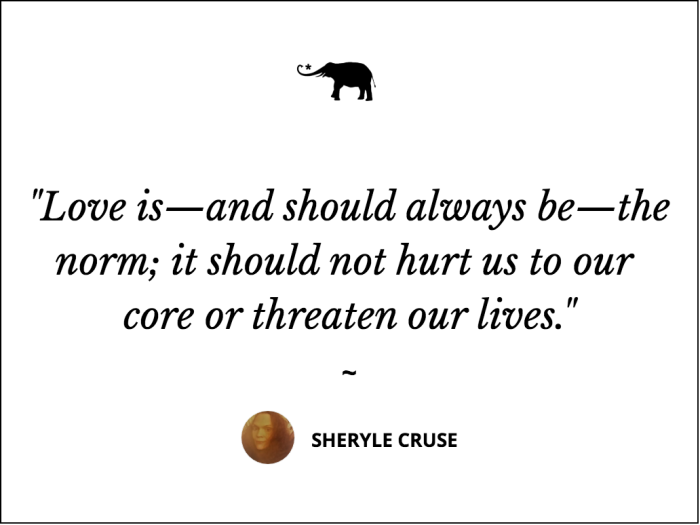View this post on Instagram
A roller-coaster relationship. Up and down. Unstable. Insecure. Uneasy.
Ever been involved in one of these suckers? Are you in one now?
As an abuse survivor, I have had my fair share of unhealthy relationships, and at the center of them all, was the intermittent, unreliable quality of good treatment versus toxic treatment. It didn’t announce itself with trumpets and obvious signals, and often, that was what added more fuel to the blindsiding fire I felt seared by.
Sounds familiar?
The rude awakening (whether executed by a blatant or a subtle method) can be everything from a passive-aggressive dig we only catch 20 minutes after it’s been said, to the full-on physical slap, kick, or punch to our person threatening our lives.
But usually, the common denominator, no matter what method is chosen, are such questions we seem to ask ourselves, like:
Why can’t they always act loving, kind, and affectionate?
Why are their moods so unpredictable?
Why don’t the happy times last for long?
Based on my personal experience, in an attempt to answer those questions, here are a few of my theories.
They don’t love us; they only love what they get from us.
“Narcissistic supply” is a well-trotted out term used to describe how we are used and abused.
The person choosing to mistreat us may not love us. They only love the supply, in a myriad of forms, because we provide for them emotional, financial, sexual, convenient, ego-driven supply. Whatever it is that we represent and give to them, they love that. They don’t go any further to recognize our individuality, our humanity, our needs, or our feelings.
We are an object, a means to an end, something to be used.
And they may have absolutely no clue, whatsoever, that they are viewing us as such. They may be completely convinced they love us and that this intermittent, unstable, using way of relating to us is, in fact, love. Or, of course, they may fully be aware they do not love us and are using us for their own purposes.
A more constant and healthy solution? Our self-love needs to be consistent.
If we feel we are deficient in the love experiences within our lives, we will often put up with—and settle for—mistreatment, neglect, and all forms of abuse. We may operate from the principle of “well, something’s better than nothing.” Therefore, as long as we get an intermittent “I love you,” hug, gift, or met need from time to time, we will endure the insult, the slap, the exploitation, or the prevalent misery.
“Well, something’s better than nothing.”
That’s music to the abuser’s ears, as they often employ their choice of intermittent behavior, be it good or bad, loving or cruel, unintentional or deliberate.
As harsh, impossible, and unwelcomed as it may be to hear and apply this, we need to love ourselves so fully, unconditionally, and doggedly that we raise the bar on what is considered acceptable and unacceptable when presented in a love context.
Many of us have been groomed from our families to accept abuse as love when we were helpless children. We were victims who should have never experienced that. We should never have learned those lessons.
Now, as recovering (because it is a lifelong, unfolding, ongoing process) adults, we can choose to pour the same amount of focus, energy, effort, and passion into ourselves as we have poured into our intermittent abuser. Therapy can help with that. Information and education about abuse can help with that. Deciding we are worthy of a healthy, safe, and satisfying love can help with that.
And again, to relieve some of any potential perfectionistic pressure, accepting it is an ongoing, imperfect, and compassionate (self-compassionate) process at that can help. Choose to take that tiny baby step toward that help right now.
Another possible reason for an intermittent abuser’s mistreatment of us?
They have decided we are responsible for their happiness and fulfillment.
Talk about a no-win situation. Yes, we were assigned a job, without our knowing it.
Many of us have been employed like this since childhood. Whatever the case may be, however old we are, whatever stage of life we may find ourselves in, the abuser has abdicated their responsibility to take charge of their own level of personal happiness and fulfillment.
Here’s where some of the “walking on eggshells” feelings pop up for us, the “or else” mentality of performing to a certain level. We feel the pressure to entertain, to allow them to live vicariously through our lives, our successes, our dreams (that is if we are allowed to have our dreams and not solely live out their unrealized or failed ones).
What’s that? You and I didn’t always want to become an attorney or a doctor, yet we find ourselves in law or medical school? Par for the course because our abusive “so and so” wanted that dream but couldn’t get there. But now, through us, they see their golden “second chance.” And, hell yes, they’re going to take it!
So, what if we don’t want it for ourselves? A minor detail because after all, this realized dream, goal, this attainment of whatever is desired, is all that matters. Eye on the prize.
The abuser’s myopic perspective, therefore, becomes our vision. Still, no matter what we do, if we achieve this object or realization of happiness for the abuser, it doesn’t deliver. There will inevitably be something wrong, something imperfect, something unfulfilled in some way.
Trying harder won’t solve things. But do we think we’ll get permission to ease up? Do we think we’ll be able to avoid having to pay for the rest of our lives? Not so fast.
We failed at our job description criteria. We didn’t achieve those much-desired results of our abuser. Plus, an added fun feature. What if we did realize a goal or a dream that makes our abuser happy, only to encounter their jealousy of us for achieving it, instead of they themselves generating those results?
Ah, yes, the green-eyed monster. Now we are their villain, “rubbing it in” as we (according to our abuser) “flaunt” the success in front of them. They will make sure to punish us for that.
We chose to pursue none of this. Yet here we are…we’re damned if we do; we’re damned if we don’t.
A more constant and healthy solution? Our self-acceptance needs to be consistent.
A lot of this is about choice—personal choice. Accepting, or rejecting, personal responsibility for one’s behaviors and actions is a matter of personal choice. That includes the level of happiness and fulfillment.
And, unfairly so, it’s going to take extra hard work on our part to recognize and apply separating our self-acceptance, our sense of self for that matter from theirs and their self-rejecting spirit.
You and I are going to need to fight, however secretly, personally, and valiantly, to find, create, and maintain anything that brings us joy, having nothing whatsoever to do with our intermittent abuser.
We cannot count of their satisfaction levels to be stable. They are, often, miserable people, refusing to address their bigger issues, like depression, addiction, or anxiety. That is their choice to make; unfortunately, a poor choice at that.
But we need to constantly remind ourselves “they” and “their” choices—and not “us” and “ours.”
It is a constant, hard-fought, hard-won battle. But we are worth so much more than being absorbed by an unstable person who, at best, is only capable of forcing us to create and execute a constantly moving target, unrealistic, and oppressive to achieve and maintain.
Our happiness and fulfillment, sad to say, will be more mercenary for us. It will exist, spiting the intermittent abuser’s desperate and cruel world view. It will be an act of defiance on our part to be and remain ourselves in these hostile surroundings.
Further expounding on yet another possible reason for an intermittent abuser’s mistreatment of us?
They choose not to deal with their own issues; we are a much more convenient scapegoat for their problems.
This extends beyond the happiness issue we just dealt with. This speaks to any and every emotion, experience, feeling, dream, expectation, frustration, or circumstance.
Well, there’s nothing like an abuser being thorough, huh?
As mentioned before, many times, our intermittent abuser refuses to deal with the deeper, more complex issues that are beyond our scope of solving. Addiction, abuse, trauma, depression, anxiety, and any kind of mental illness struggle are included in that. This is the realm of professional treatment. The answer does not reside with us simply “trying harder.”
But our intermittent abuser insists that is the answer. And, of course, when we fail to solve things for them, we are scapegoated as the villain, the bane of their existence, the reason for their lot in life.
Again, the abuser’s thorough covering it all, huh?
A more constant and healthy solution? Our self-regulation needs to be consistent.
The intermittent abuser, unfortunately, has rejected personal responsibility for their own healthy self-regulation. Therefore, once again, we need to be mercenary about addressing and maintaining ours.
It can be difficult to separate our self-regulation issues from that of our abusers, especially as we try to survive their inability and unwillingness to self-regulate in the first place. We cannot change them, fix them, help them, save them. Brutal, especially if we love them.
Nevertheless, we must love ourselves, accept ourselves, and take responsibility for our own self-regulation.
Are we depressed? Anxious? Struggling with our own mental health? Again, what are we doing about our own lives and their corresponding issues? Are we addicts, even if that addiction is to our abuser? How are we dealing with the answer to that question?
Are we only “okay” if and when they are “okay?”
Part of our healing involves regulating ourselves, with or without the cooperation and permission of our abuser.
And here’s a secret: we may never get either from them.
They are not hardwired to allow for our separation from them, or our healing from them. It serves their best interest if we operate from a place of disease, dysfunction, low energy, and confusion. Clarity can give peace, and with that peace the ability to make better choices. Intermittent abusers don’t want that typically for us.
They want us desperately making unhealthy and unsafe, destabilizing choices because that way they can continue to have the upper hand.
And that is a must for abusers. They must be all-powerful while we remain power-less.
Discerning between the two:
The intermittent abuse and abuser we experience, therefore, can often require a shift in focus. We need to change the emphasis from them to us instead. We must be focus number one.
Many of us have never been allowed that. We have been at the mercy of reacting to the abuse and the abuser. Intermittent behaviors, be they desired or hated, have kept us off-kilter.
Again, it comes down to separation. The intermittent factor we have experienced demands we examine, discern, and separate.
Is what and who we encounter dependable? Is this person, relationship, experience, word, or deed dependable? Healthy? Safe? Loving? Trustworthy? Or are there extreme, destabilizing conditions that confuse and torment us? What are they? Name them!
Do you and I feel loved…consistently or conditionally?
Yes, there are changes and fluctuations to life, moods, and experiences, but there should not be the widely swinging gamut of personal treatment from one human being to another. That is about an unhealthy abusive pattern at work, not the regular changing vicissitudes of life.
Mistreatment is never normal. Abuse is never normal.
Love is—and should always be—the norm; it should not hurt us to our core or threaten our lives. We deserve lives that are consistently ours. No matter what the intermittent abuser thinks about that, we still deserve that consistent stability.
Let’s keep working and living toward that reality.
~


 Share on bsky
Share on bsky





Read 1 comment and reply